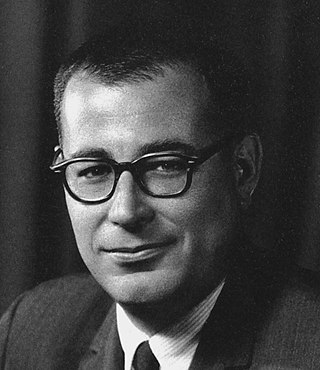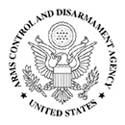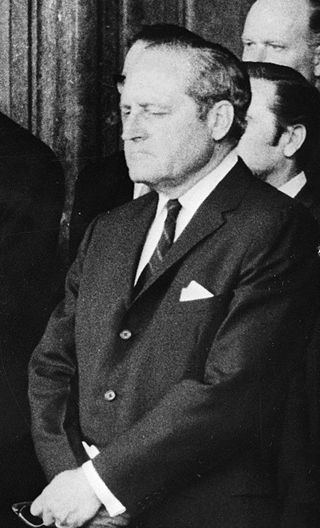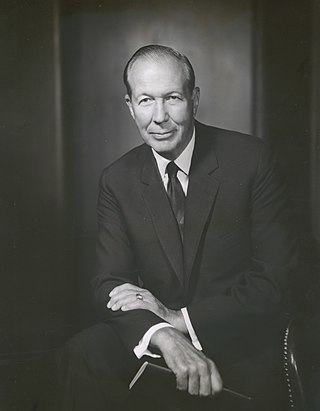
John D. Holum (born December 4, 1940) was Director of the U.S. Arms Control and Disarmament Agency and Under Secretary of State for Arms Control and International Security under Bill Clinton. [1]

John D. Holum (born December 4, 1940) was Director of the U.S. Arms Control and Disarmament Agency and Under Secretary of State for Arms Control and International Security under Bill Clinton. [1]
John D. Holum was born on December 4, 1940, in Highmore, South Dakota. [2] He received a B.A. in mathematics and physics from Northern Michigan College and a J.D. from George Washington University School of Law in 1970. [2]
From 1965 to 1979 he worked as legislative director for Senator George McGovern. [2] When McGovern ran for president in 1972, Holum wrote his 56-page position paper on defense policy, which advocated cutting the defense budget from $87.3 billion in 1972 to $54.8 billion in 1975, a proposal Theodore White characterized as "an extraordinary flight of one man's imagination." [3] From 1979 to 1981, he worked as a Policy Planning staffer in the U.S. Department of State. [2] From 1981 to 1992, he worked in Washington, D.C. for O'Melveny & Myers. [2] In 1992, he joined Bill Clinton's campaign, until he was appointed as Director of the U.S. Arms Control and Disarmament Agency in 1993. [2] He served as Acting Under Secretary of State for Arms Control and International Security from 1997 until he was confirmed in 2000. [2] He left his job in 2001, with George W. Bush's administration.

William James Perry is an American mathematician, engineer, businessman, and civil servant who was the United States Secretary of Defense from February 3, 1994, to January 23, 1997, under President Bill Clinton. He also served as Deputy Secretary of Defense (1993–1994) and Under Secretary of Defense for Research and Engineering (1977–1981).

Harold Brown was an American nuclear physicist who served as United States Secretary of Defense from 1977 to 1981, under President Jimmy Carter. Previously, in the John F. Kennedy and Lyndon B. Johnson administrations, he held the posts of Director of Defense Research and Engineering (1961–1965) and United States Secretary of the Air Force (1965–1969).

Paul Henry Nitze was an American politician who served as United States Deputy Secretary of Defense, U.S. Secretary of the Navy, and Director of Policy Planning for the U.S. State Department. He is best known for being the principal author of NSC 68 and the co-founder of Team B. He helped shape Cold War defense policy over the course of numerous presidential administrations.

Stephen John Hadley is an American attorney and senior government official who served as the 20th United States National Security Advisor from 2005 to 2009. He served under President George W. Bush during the second term of his administration. Hadley was Deputy National Security Advisor during Bush's first term. Before that Hadley served in a variety of capacities in the defense and national security fields. He has also worked as a lawyer and consultant in private practice.

Paul Culliton Warnke was an American diplomat.

Jack Dyer Crouch II is an American diplomat and national security adviser. Since 2014, he has been president and chief executive officer (CEO) of the United Service Organizations (USO).

The U.S. Arms Control and Disarmament Agency (ACDA) was an independent agency of the United States government that existed from 1961 to 1999. Its mission was to strengthen United States national security by "formulating, advocating, negotiating, implementing and verifying effective arms control, nonproliferation, and disarmament policies, strategies, and agreements."

Gerard Coad Smith was an American attorney and defense expert who served as the chief U.S. delegate to the Strategic Arms Limitation Talks (SALT) in 1969 and the first U.S. Chairman of the Trilateral Commission. He was awarded the Presidential Medal of Freedom on January 16, 1981 by President Jimmy Carter.
Ralph Earle II was an American diplomat and arms control negotiator. He was a key architect of several major international arms control accords. He served as the United States' chief negotiator at the SALT II round of talks on nuclear disarmament from 1978 to 1979, as director of the Arms Control and Disarmament Agency (ACDA) between 1980 and 1981 and as deputy director at the ACDA from 1994 to 1999.

The Under Secretary for Arms Control and International Security Affairs (T) is a position within the U.S. Department of State that serves as Senior Adviser to the President and the Secretary of State for Arms Control, Nonproliferation, and Disarmament.

Lieutenant General George Marion Seignious U.S. Army was a distinguished military leader, diplomat and college president.

Paula Adamo DeSutter was United States Assistant Secretary of State for Verification, Compliance, and Implementation from 2002 to 2009.
David Laurence Aaron is an American diplomat and writer who served in the Jimmy Carter and Bill Clinton administrations. He graduated from Occidental College with a BA, and from Princeton University with an MPA. He later received an honorary Ph.D from Occidental College. He is currently director of the RAND Corporation's Center for Middle East Public Policy.

Ambassador Ronald Frank Lehman II is currently Director of the Center for Global Security Research at the United States Department of Energy's Lawrence Livermore National Laboratory. He is also Chair of the Governing Board of International Science and Technology Center, an intergovernmental organization headquartered in Moscow and is a member of the Department of Defense Threat Reduction Advisory Committee.
William Robert Van Cleave was a former advisor to President Ronald Reagan, the United States Department of Defense, and Department of State as well as Emeritus Professor, former head, and the founder of Missouri State University's Department of Defense and Strategic Studies (DSS). The DSS program is now located in Fairfax, VA, 10 miles from Washington D.C. He was also advisory council member of the Center for Security Policy, board advisor of the American Center for Democracy and National Institute for Public Policy. As a strategic thinker, he is remembered as a leading Cold Warrior and long-standing hawkish policy advocate.
Ambassador Thomas Graham Jr. is a former senior U.S. diplomat. Graham was involved in the negotiation of every single international arms control and non-proliferation agreement from 1970 to 1997. This includes the Strategic Arms Limitation Talks, the Strategic Arms Reduction Treaties, the Anti-ballistic missile (ABM) Treaty, Intermediate-Range Nuclear Forces Treaty (INF) Treaty, Treaty on the Non-Proliferation of Nuclear Weapons Treaty (NPT), Treaty on Conventional Armed Forces in Europe (CFE) Treaty and Comprehensive Nuclear-Test-Ban Treaty (CTBT). In 1993, Ambassador Graham served as acting director of the Arms Control and Disarmament Agency (ACDA) from January to November, 1993 and Acting Deputy Director from November, 1993 to July, 1994. From 1994 through 1997, he was president Bill Clinton's special representative for Arms Control, Non-Proliferation, and Disarmament. Graham successfully led the U.S. government efforts to achieve the permanent extension of the NPT in 1995. Graham also served for 15 years as the general counsel of ACDA. Throughout his career, Thomas Graham has worked with six U.S. Presidents including Presidents Richard Nixon, Gerald Ford, Jimmy Carter, Ronald Reagan, George H. W. Bush, and Bill Clinton. Ambassador Graham worked on the negotiation of the Chemical Weapons Convention and the Biological Weapons Convention and managed the Senate approval of the ratification of the Geneva Protocol banning the use of chemical and biological weapons in war, as well as the Biological Weapons Convention.
Michael Leonard Nacht is an American government official and an author of five books and 70 journal articles.

William Chapman Foster was an American businessman and high-ranking government official. He served as United States Under Secretary of Commerce and United States Deputy Secretary of Defense under President Harry Truman. Later, he served as the first United States Arms Control and Disarmament Agency director, under Presidents John F. Kennedy and Lyndon B. Johnson.